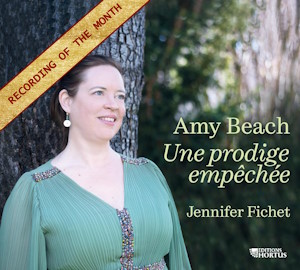
Amy Beach (1867-1944)
Une prodige empêchée
Jennifer Fichet (piano)
No recording date or location given
Notes in English and French
Hortus 237 [76]
Although there have been several recordings issued of Amy Beach’s piano music over recent years, this is my first encounter with it. I have to say, I was somewhat taken aback as to how attractive it is, and I listened to this new release three times through before sitting down to write my review.
One thing that immediately struck me was the fact that Beach must have been a very fine pianist indeed to compose works of such virtuosity, intricately woven harmonic textures, not to mention a rich pool of beguiling lyricism. She was something of a child prodigy and debuted as a pianist in 1883, the same year she published her first compositions. Two years later, she married and had to curtail her performing activities in accordance with the wishes of her husband. Thereafter, until his death in 1910, she concentrated on composition. She was a prolific composer. From 1910 she resumed her concertizing as a pianist, travelling far and wide to great critical acclaim. In this way, she promoted her own music.
The earliest piece here is the Valse-Caprice, Op 4 from 1889. It’s the perfect curtain raiser with its sparkling finger work and decorative filigree. A favourite of Josef Hofmann, it receives a scintillating account from Fichet. The Ballade, Op 6 from five years later, is a dramatic narrative on the grand scale; it rises to a passionate climax of white heat intensity. Beach published a cycle of four pieces titled Sketches, Op 15 in 1892. We’re treated to two of these, No 3 Dreaming, my favourite piece on the disc, just exquisite, and No 4 Fireflies, mercurial and whimsical.
At almost twenty minutes, Variations on Balkan Themes, Op 60 is Beach’s most significant and substantial work in the programme. It dates from 1904. Fichet plays a revised version from 1936, featuring fewer repeats and the deletion of the long coda. The work is based on Serbian songs “of unknown origin”. There are eleven variations in all, and each is imaginatively constructed. There’s a wealth of variety among the variations, too, with a polonaise, barcarolle, waltz, funeral march and a Hungarian dance, to name but five. Some may detect a hint of melancholy running throughout its course.
The Old Chapel by Moonlight, Op 106 was written in 1924 and its chordal melody conveys a sense of emptiness and glacial chill. Not your conventional nocturne. Beach’s Nocturne, Op 107 is forthright and noble, with an underlying vehemence. Another substantial work at nearly ten minutes in length is the 1926 Valse-Fantaisie tyrolienne, Op 116. It’s an ingeniously constructed salon piece of great charm and elegance. The Five Improvisations, Op 148 are late works penned in 1934. No 1 concerns itself with suspense and atmosphere, achieved by some luminous and diaphanous sonorities from the pianist. No 3 reminded me of a movement from Jean Cras’ Piano Trio. No 4 is static, whilst the final one is a slow mazurka.
Jennifer Fichet is to be wholeheartedly commended for her commitment and endeavours in conveying the heart and intensity for these seductive scores. Although no venue is given, both the acoustic and the beautifully rich toned Steinway D do full justice to the thoroughly idiomatic and assured playing of the pianist. The booklet, in French and English, provides a very useful commentary on the pieces performed.
A perfect joy through and through.
Stephen Greenbank
Buying this recording via a link below generates revenue for MWI and helps us keep free access to the site


Contents:
Valse-Caprice, Op 4 (1889)
Ballade, Op 6 (1894)
Four Sketches, Op 15 (1892)
III. Dreaming
IV. Fireflies
Variations on Balkan Themes, Op 60 (1904, rev.1936)
Piano Compositions, Op 102 (1924)
I. Farewell, Summer
II. Dancing Leaves
The Old Chapel by Moonlight, Op 106 (1924)
Nocturne, Op 107 (1924)
A Cradle Song of the Lonely Mother, Op 108 (1924)
Valse-Fantaisie tyrolienne, Op 116 (1926)
Five Improvisations, Op 148 (1934)
















